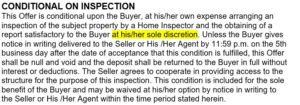
We are hearing that during this period of interest rate hikes more than one buyer has put an offer in on a property, conditional on financing and/or inspection, and when it came time to waive it they failed to do so. This is even though there was no legitimate reason not to waive the clause(s). The buyers were using these clauses as “get out of jail free” cards to walk away from the purchase of a property because they had changed their mind about the purchase. One speculates that a reason they may be walking away is that they realised that it would be difficult for them to sell their own property and decided not to go through with the purchase. However, buyers who choose to act in this manner should think twice before doing so, because they may be liable for the Sellers’ damages.
A Buyer may enter into an Agreement of Purchase and Sale and add various conditions; the two most common being a condition on financing and a condition on inspection. These contractual conditions are usually subject to the Buyer’s discretionary judgment and are sometimes called “sole discretion clauses” – as in the waiver of these clauses are in the sole discretion of the Purchaser.
However, a Buyer cannot simply insert them into an Agreement of Purchase and Sale and use them to “walk away” from the purchase of the property at their whim. No contractual discretion is completely absolute. Even a broadly stated contractual discretion is not “unbridled” and is subject to established limits. These sole discretion clauses must be exercised honestly and in good faith.
In Greenberg and in Canadian National Railway Co. v. Inglis Ltd., 1997 CanLII 1070 (ON CA) the Court recognized that provisions in agreements making payment or performance subject to “the discretion”, “the opinion” or “the satisfaction” of a party to the agreement or a third party, generally fall into two categories:
- In contracts in which the matter to be decided or approved is not readily susceptible of objective measurement — matters involving taste, sensibility, personal compatibility or judgment of the party for whose benefit the authority was given — such provisions are more likely construed as imposing only a subjective standard; and
- On the other hand, in contracts relating to such matters as operative fitness, structural completion, mechanical utility or marketability, these provisions are generally construed as imposing an objective standard of reasonableness.
The contract controls the standard to be applied to a sole discretion clause. The determination of whether a discretionary condition imposes a subjective or objective standard depends upon “the intention of the parties as disclosed by their contract”.
In Marshall v. Bernard Place Corp., 2002 CanLII 24835 (ON CA), the Ontario Court of Appeal set out the legal analysis as follows:
This good faith requirement applies whether the exercise of the discretion is measured by an objective or subjective standard, and the determination of whether a discretionary condition imposes a subjective or objective standard depends upon the intention of the parties as disclosed by their contract. The intention of the parties, as reflected in the language of the condition, then determines the scope of the subjective assessment of the materiality of the identified deficiencies.
Marshall was a case involving a home inspection clause where the purchaser was found to be entitled to refuse to complete when the inspection disclosed some deficiencies, and the purchaser’s deposit was returned. Good faith was found in Marshall based in part on the prospective purchaser’s timely communication of the results of the inspection and the intention to rely upon it.
Where no good faith is found, courts may award damages to the seller for reasonable foreseeable damages the seller incurred in the failure of the buyer to exercise these sole discretion conditions in good faith.
If a buyer uses the failure to obtain financing to walk away from a purchase when they did or could have obtained financing and are simply looking for an easy “exit”, they have behaved in bad faith and could likely be found by a court to have breached the agreement to purchase the home. This would make them open to damages.
While it may be hard to prove, if you believe the other party to your agreement failed to exercise a sole discretion condition in good faith, call your lawyer they will assess your rights and your damages in such a case. If you are a party that wants to exercise your discretion pursuant to a condition, seek legal advise to ascertain whether you can do so without opening yourself up to liability.
The foregoing should not be considered to be legal advice and should not be relied upon as such. Please consult a lawyer to get advice and an opinion on your unique circumstances.
Courtesy of Evelyn Perez Youssoufian, O’Connor MacLeod Hanna LLP

